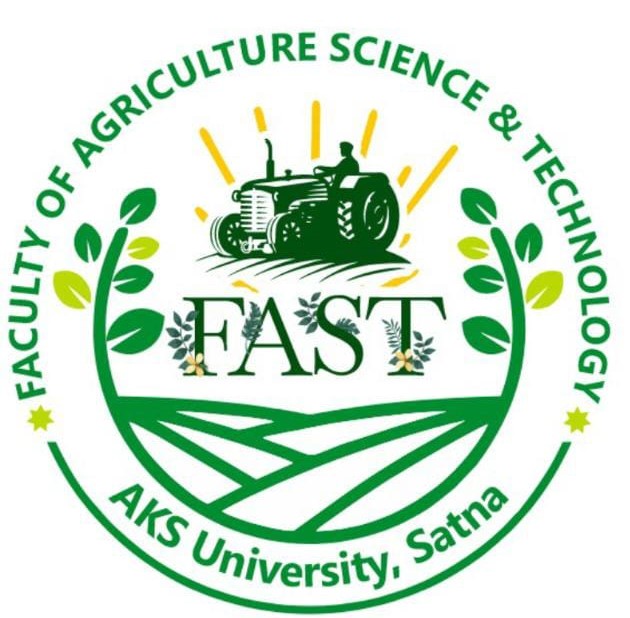Department of Plant Pathology
About the Department
Vision
Mission
HOD's Desk
Graduate Attributes (GA)
About the Department
Overview of the Department
The department was established in July 2019 with the admission of four students in M.Sc. (Ag.)
Plant Pathology program. The department has well trained, experienced and qualified plant
Pathologists for fulfillment of vision and mission of the university as well as of department. It
Focusses on the disease diagnosis, interaction between pathogen, host and changing climate as
well as sustainable management of plant diseases to upgrade the farmers’ status.
Achieving milestone by implementing NEP-2020
- Well-equipped laboratory
- More than 10 research papers & book chapters in last five years
- Research based on farmers need
- More than 50 diseases have been diagnosed from AKS University farm during last 2 years.
- Scientific and technical knowledge transferred to the farmers through Kisan Sangoshthi in nearby villages of Satna.
Vision
Vision
To be a leader in research, teaching, and extension involving plant health, while serving the
changing needs of society, the environment, and the University.

Mission
Mission
Providing experiential education to be a competent in resolving complex challenges of spot
diagnosis, biology of pathogenic and beneficial microbes and designing sustainable management
strategies of 21st Century and secure food supply while protecting our environment.
HOD's Desk
Dr. Doomar Singh
M.Sc. (Ag) Plant Pathology, Ph.D. in Plant Planthology, AMU AligarhHead of the Department Department of Plant PathologyAKS University, Satna (M.P.) India – 485001

Message
I extend a heartful, warm welcome to the students from all over India who will have to choose M.Sc. (Agri.) and Ph.D. programs in Plant Pathology in the faculty of Agriculture Science and
Technology at AKS University, Satna.
The department of Plant Pathology has been started in July 2019. The department is following curriculum of PG as per guidelines of ICAR, New Delhi
and Ph.D. as per the guidelines of UGC.
The department of Plant Pathology has been marching ahead to attain vision and mission of the University as well as the department to become research, innovate and self-employed oriented programme. Which will fulfil the motto of the University “Atma Dipo Bhav”.
I wish to develop my students as thinkers, researchers, entrepreneurs, philosophers, self- employable, discission maker and capable of solving challenges of 21st century. I have been continuously striving hard for providing quality and updated education with emphasis on research, innovation, entrepreneurship and startups.
The curricula of M.Sc. (Agri.) and Ph.D. in Plant Pathology are most contemporary, relevant, updated. The department has implemented NEP 2020 at under graduate, post graduate and Ph.D. programs. The department has also been developing various benchmarks of quality assurance, promotion of research and innovation among faculties and students. The faculty members in the department are well qualified and highly experienced from central universities.
I have full trust that during perusing your programme in plant pathology at AKS University, your intellectual capabilities will be honed and you will be exposed to most contemporary knowledge and you will emerge as most successful plant pathologist of this department.
I wish you all success in your present and future endeavors.
The department of Plant Pathology has been marching ahead to attain vision and mission of the University as well as the department to become research, innovate and self-employed oriented programme. Which will fulfil the motto of the University “Atma Dipo Bhav”.
I wish to develop my students as thinkers, researchers, entrepreneurs, philosophers, self- employable, discission maker and capable of solving challenges of 21st century. I have been continuously striving hard for providing quality and updated education with emphasis on research, innovation, entrepreneurship and startups.
The curricula of M.Sc. (Agri.) and Ph.D. in Plant Pathology are most contemporary, relevant, updated. The department has implemented NEP 2020 at under graduate, post graduate and Ph.D. programs. The department has also been developing various benchmarks of quality assurance, promotion of research and innovation among faculties and students. The faculty members in the department are well qualified and highly experienced from central universities.
I have full trust that during perusing your programme in plant pathology at AKS University, your intellectual capabilities will be honed and you will be exposed to most contemporary knowledge and you will emerge as most successful plant pathologist of this department.
I wish you all success in your present and future endeavors.
Graduate Attributes (GA)
Graduate Attributes (GA)
The Graduate Attributes are the knowledge skills and attitudes which the students have at the time of graduation. These attributes are generic and are common to all programs.
1. Technical Knowledge: Apply the knowledge of fundamentals, and a specialization to identify the solutions of complex agricultural science-based challenges.
2. Problem Findings: Identify, formulate, review and analyze complex plant pathological problems reaching substantiated conclusions using multidisciplinary approach.
3. Skill Development: Design strategies for complex problems and design system components or processes that meet the specified needs with appropriate consideration for the crop health, sustainability and the cultural, societal, and environmental considerations with core and soft skills.
4. Research Oriented Learning: Use research-based knowledge and research methods including design of experiments, analysis and interpretation of data, and synthesis of the information to provide valid conclusions.
5. Technical Development: Create, select, and apply appropriate techniques, resources, and modern IT tools including prediction and modeling to complex activities with an understanding of the limitations.
6. Contribution in Society Development: Apply reasoning informed by the contextual knowledge to assess societal, health, safety, legal and cultural issues and the consequent responsibilities relevant to the professional practice.
7. Environment and Sustainability: Understand the impact of the professional technical solutions in societal and environmental contexts, and demonstrate the knowledge and need for sustainable management.
8. Ethics: Apply ethical principles and commit to professional ethics and responsibilities and norms of the plant pathological techniques.
9. Project and Practical Skills: Demonstrate knowledge and understanding of the plant pathological principles and apply these to one’s own work as a member and leader in a team to manage projects.
10. Life-long Learning: Recognize the need for, and have the preparation and ability to engage in independent and life-long learning in the broadest context of technological change.
1. Technical Knowledge: Apply the knowledge of fundamentals, and a specialization to identify the solutions of complex agricultural science-based challenges.
2. Problem Findings: Identify, formulate, review and analyze complex plant pathological problems reaching substantiated conclusions using multidisciplinary approach.
3. Skill Development: Design strategies for complex problems and design system components or processes that meet the specified needs with appropriate consideration for the crop health, sustainability and the cultural, societal, and environmental considerations with core and soft skills.
4. Research Oriented Learning: Use research-based knowledge and research methods including design of experiments, analysis and interpretation of data, and synthesis of the information to provide valid conclusions.
5. Technical Development: Create, select, and apply appropriate techniques, resources, and modern IT tools including prediction and modeling to complex activities with an understanding of the limitations.
6. Contribution in Society Development: Apply reasoning informed by the contextual knowledge to assess societal, health, safety, legal and cultural issues and the consequent responsibilities relevant to the professional practice.
7. Environment and Sustainability: Understand the impact of the professional technical solutions in societal and environmental contexts, and demonstrate the knowledge and need for sustainable management.
8. Ethics: Apply ethical principles and commit to professional ethics and responsibilities and norms of the plant pathological techniques.
9. Project and Practical Skills: Demonstrate knowledge and understanding of the plant pathological principles and apply these to one’s own work as a member and leader in a team to manage projects.
10. Life-long Learning: Recognize the need for, and have the preparation and ability to engage in independent and life-long learning in the broadest context of technological change.

